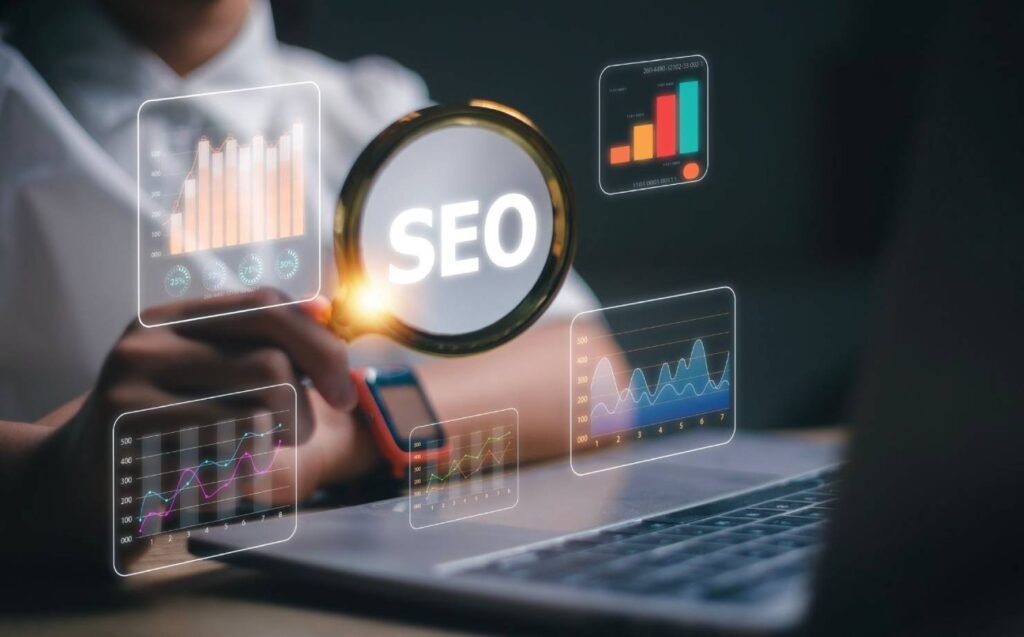What is SEO and digital positioning: A complete guide

In the digital world, having an online presence is essential for any business or brand.
However, it is not enough to have a website or social media profiles.
To stand out on the web, it is necessary to implement digital positioning strategies that allow search engines, such as Google, Bing and Yahoo, to find and display our content to users.
This is where SEO or Search Engine Optimization comes into play.
SEO is a set of techniques and strategies used to improve the visibility of a website in organic search engine results.
In other words, it is about optimizing our content so that it appears at the top of the search results when someone searches for a keyword related to our business or brand.
With SEO, we can increase traffic to our website, improve our digital reputation and ultimately increase our sales.
At our digital marketing agency, we offer SEO marketing services to help our clients stand out on the web.
Our team of SEO experts work together to develop customized strategies that are tailored to each client’s needs and goals.
From keyword research to content optimization and link building, we ensure that our clients have a strong and effective online presence.
Would you like to increase the organic traffic of your project?
At Virtual Arena we are SEO professionals with years of experience and projects behind us.
SEO Fundamentals
SEO is a digital marketing strategy that focuses on improving a website’s visibility in organic search engine results.
To achieve this, it is necessary to understand the fundamentals of SEO and how they can be applied to improve a website’s position in search results.
Keywords and content
One of the most important fundamentals of SEO is the selection of keywords and the creation of relevant content.
Keywords are terms or phrases that users use to search for information in search engines.
It is important to select relevant keywords for a website’s content, as this helps search engines understand what the site is about.
In addition, it is important to create quality content that is optimized for the selected keywords.
The content should be informative, useful and relevant to the user.
It is also important to ensure that the content is easy to read and well structured.
Relevance and context
Another important factor in SEO is relevance and context.
Search engines use algorithms to determine the relevance of a website for a specific search.
This means that it is important to make sure that a website’s content is relevant to the selected keywords.
In addition, context is also important.
Search engines analyze the content of a website to determine the overall theme of the site.
Therefore, it is important to make sure that the content of a website is well organized and easy to understand.
Importance of user experience
Finally, user experience is an important factor in SEO.
Search engines want to provide relevant and useful results for users.
Therefore, it is important to ensure that the user experience on a website is positive.
This means that the website should be easy to navigate, fast and optimized for mobile devices.
It is also important to ensure that the content of a website is easy to read and well structured.
In summary, the fundamentals of SEO include keyword selection and relevant content creation, relevance and context, and the importance of user experience.
By understanding these fundamentals, you can improve a website’s position in search results and increase its online visibility.

On-Page optimization strategies
In our SEO strategy, it is important to take into account the On-Page optimization, which refers to the techniques that are applied directly on the website to improve its positioning in search engines.
Here are some key strategies to consider:
Keyword optimization
Keyword optimization is one of the most important techniques in On-Page optimization.
It consists of identifying the keywords relevant to our business and making sure they are present in key places on our web page, such as in the title tag, meta descriptions, headings and content.
It is important not to overload our page with keywords, as this can be penalized by search engines.
Importance of headings
Headings are important both for visitors to our site and for search engines.
Using clear and descriptive headings helps visitors navigate our page and find the information they need.
In addition, headings also help search engines understand the structure and content of our page, which can improve our ranking in search results.
Loading speed and accessibility
Loading speed and accessibility are important factors in On-Page optimization.
If our page takes too long to load, visitors may leave before they can see our content.
In addition, search engines may also penalize pages that take too long to load.
Therefore, it is important to make sure that our page loads quickly and is accessible to all users, including those with visual or hearing disabilities.
In summary, On-Page optimization is essential to improve our search engine rankings.
By applying these keyword optimization strategies, clear and descriptive headings, and a fast and accessible page, we can improve our online visibility and attract more traffic to our website.

Off-Page SEO and link building
In the world of SEO, link building is one of the most important techniques for improving a website’s search engine ranking.
Off-Page SEO refers to any action taken outside the website to improve its visibility and authority online.
Backlinks and Internal Links
Backlinks or external links are one of the most important factors in Off-Page SEO.
Backlinks are links that point to our website from other websites.
It is important that these links are of quality and come from relevant and authoritative websites in our industry.
In addition, internal links are also very important for SEO, as they help search engines understand the structure and content of our website.
Domain and page authority
Domain and page authority are two important metrics for Off-Page SEO.
Domain authority refers to the overall reputation of our website on the Internet, while page authority refers to the reputation of a specific web page within our website.
Both metrics are calculated based on the quantity and quality of external links pointing to our website.
Local SEO and citations
Local SEO refers to the optimization of our website for local searches.
Citations are mentions of our business online, such as in business directories, yellow pages, etc.
Citations are important for Local SEO, as they help search engines understand the location and relevance of our business for local searches.
In conclusion, Off-Page SEO and link building are important techniques to improve a website’s search engine ranking.
Backlinks, domain and page authority, internal links, Local SEO and citations are some of the most important factors in Off-Page SEO.
It is important to use these techniques ethically and effectively to improve the visibility and authority of our website online.

Technical SEO and crawling
In our SEO strategy, technical SEO is one of the most important parts.
Technical SEO focuses on improving site structure and usability so that search engines can crawl and index the website effectively.
Indexing and site structure
Indexing is the process in which search engines collect information about the website and store it in their database.
For a website to be indexed correctly, it is important to have a clear and organized site structure.
This means that the pages of the site should be organized into categories and subcategories, and that internal links should be clear and easy to follow.
In addition, it is important to make sure that the website has a robots.txt file and an XML sitemap.
The robots.txt file tells search engines which pages on the website they can and cannot crawl.
The XML sitemap is a file that lists all the pages of the website and helps search engines find and crawl all the pages.
Usability and mobile devices
Website usability is another important part of technical SEO.
A website that is easy to use and navigate not only improves the user experience, but also helps search engines better understand the content of the website.
It is important that the website is easy to navigate both on a desktop computer and on a mobile device.
Today, more than 50% of Google searches are performed from mobile devices, so it is crucial that the website is optimized for mobile devices.
In short, technical SEO is a fundamental part of any SEO strategy.
By improving site structure and usability, we can help search engines crawl and index the website effectively.

SEO and digital marketing
Nowadays, SEO and digital marketing are closely related.
To be successful in promoting a brand, it is necessary to have a digital marketing strategy that includes SEO as one of its main tools.
Integration with Social Networks
Social networks are a fundamental part of digital marketing.
Not only do they allow brands to interact with their audience directly, but they are also an excellent source of traffic to the website.
For this reason, it is important to integrate social networks into the SEO and digital marketing strategy.
A good SEO and digital marketing plan should include the creation of quality content for social networks, the promotion of the brand’s products or services on these platforms and interaction with followers.
In addition, it is important to keep in mind that social networks also influence the positioning of the website in search engines.
Content marketing and brand strategy
Content marketing is a digital marketing technique that consists of the creation and distribution of relevant and valuable content to attract and retain an audience.
This technique is fundamental for SEO, since quality content is one of the main factors in search engine rankings.
Brand strategy is also essential in SEO and digital marketing.
Branding is the image that consumers have of a company, and it is important that this image is consistent across all communication channels, including the website, social media and content.
In summary, SEO and digital marketing are two disciplines that complement each other.
The integration of social media and brand strategy are two key aspects to achieve an effective SEO and digital marketing strategy.

SEO analysis and tracking
In our SEO strategy, it is essential to constantly monitor and analyze the traffic and conversion metrics of our website.
In this way, we can evaluate the effectiveness of our actions and make adjustments in real time to improve our positioning.
Traffic and conversion measurement
To measure traffic and conversions, it is important to use web analytics tools like Google Analytics.
This tool allows us to know the number of visits, the time spent on the site, the bounce rate and other important indicators to evaluate the performance of our website.
In addition, we can measure the conversion rate of our website, which refers to the proportion of visitors who perform a desired action, such as completing a form or making a purchase.
To measure the conversion rate, it is important to define clear and specific goals and track them in Google Analytics.
SEO tools and metrics
There are several SEO tools and metrics that allow us to evaluate the performance of our website and make adjustments to improve our positioning.
Some of the most commonly used tools are:
- Google Search Console: allows us to know the performance of our website in Google search results, as well as to identify errors and technical problems that may affect our positioning.
- Ahrefs: is a backlink analysis tool that allows us to know the links pointing to our website and evaluate their quality.
- Moz: is a keyword analysis tool that allows us to know the volume of searches for a keyword, the difficulty to position it and other important metrics.
In addition, some of the most important SEO metrics to keep in mind are:
- CTR (Click Through Rate): refers to the proportion of clicks our website receives in Google search results.
A high CTR rate indicates that our website is relevant and attractive to users. - Organic traffic: refers to the number of visits our website receives through Google search results.
High organic traffic indicates that our website is well positioned for relevant keywords.
In summary, the analysis and constant monitoring of traffic metrics and conversions of our website, as well as the use of SEO tools and metrics, are essential to improve our positioning in Google search results.

Trends and future of SEO
Today, SEO is a constantly evolving and changing discipline.
To keep up with the latest trends and practices, it is important to be aware of new technologies and tools that are emerging.
In this section, we will explore some of the trends and the future of SEO.
SEO and artificial intelligence
Artificial intelligence (AI) is transforming the way search engines process and display search results.
Google’s search algorithms are increasingly using AI to understand the context and intent behind search queries.
This means that relevant, high-quality content is more important than ever in SEO.
AI is also changing the way voice searches are conducted.
With the growing popularity of virtual assistants such as Siri and Alexa, search engines are using AI to better understand natural language and provide more accurate responses to voice search queries.
Evolution of Search Algorithms
Search algorithms are the foundation of SEO.
Over the years, search algorithms have evolved to provide more accurate and relevant search results.
Google’s search algorithms, for example, have gone through several major updates, including Panda, Penguin and Hummingbird.
In the future, search algorithms are expected to become even more sophisticated and personalized.
Search engines will increasingly use AI to better understand the context and intent behind search queries, which means that relevant, high-quality content will become even more important in SEO.
In short, SEO is a constantly evolving and changing discipline.
Emerging trends, such as AI and increasingly sophisticated search algorithms, are changing the way SEO is performed.
To keep up with the latest trends and practices, it is important to stay abreast of new technologies and tools that are emerging.
Frequently asked questions about SEO
How does SEO work in digital marketing?
SEO in digital marketing is a strategy that seeks to improve the visibility and positioning of a website in the search results of search engines.
This is achieved by optimizing the website and creating relevant, quality content that attracts users and converts them into potential customers.
SEO also involves the use of link building techniques and monitoring the performance of the website to adjust the strategy as needed.
What are the benefits of implementing SEO in a company?
Implementing an SEO strategy can have many benefits for a company, such as increasing online visibility, attracting new customers, improving brand reputation and increasing revenue.
In addition, SEO can be a cost-effective digital marketing strategy in the long term, as once a good ranking is achieved, it can be maintained with proper maintenance.
How does SEO differ from SEM?
SEO and SEM are two different digital marketing strategies.
SEO focuses on improving a website’s organic ranking in search results, while SEM focuses on improving a website’s visibility through paid search engine advertising.
SEO is a long-term strategy, while SEM can provide quick but short-term results.
What SEO strategies are effective for improving digital positioning?
Some effective SEO strategies include creating quality and relevant content, optimizing keywords, using link building techniques, monitoring website performance and improving the user experience.
It is important to keep in mind that SEO is an ongoing process and strategies should be adjusted as needed.
How can the success of an SEO marketing campaign be measured?
The success of an SEO marketing campaign can be measured by tracking various metrics such as website traffic, conversions, time spent on the website and bounce rate.
It is also important to keep in mind that the success of an SEO campaign can take time to manifest itself and that patience and perseverance must be exercised in the process.
What common mistakes should be avoided when developing an SEO strategy?
Some common mistakes to avoid when developing an SEO strategy include over-optimizing keywords, creating low-quality content and using unethical link building techniques.
It is also important to keep in mind that SEO is an ongoing process and that short-term strategies that can damage a website’s reputation in the long run should be avoided.
Share note:
Recent articles

3D Animation: Current Trends and Innovations

Services marketing: Effective strategies for customer loyalty

3D Hologram What is it and what are its applications?
Contact with experts
Looking to create a project with immersive technologies?
At Virtual Arena we are professionals in creating digital experiences.
Do you have a project in mind?
Related articles




